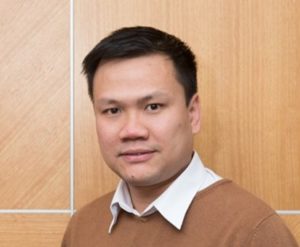Dr Truong is an ARC DECRA Fellow and a group leader at the Monash Institute of Pharmaceutical Sciences, Monash University, Australia. Dr Truong received his PhD in 2013 from the University of Queensland, Australia. After that, he took up a postdoctoral position working with Prof Thomas Davis at Monash University. Dr Truong’s work uniquely spans across multiple research fields (polymer chemistry, nanotechnology, materials, biology, immunology, medical imaging and pharmaceutical sciences), allowing him to solve complex challenges in both fundamental synthesis and biomedical applications. Currently, his group focuses on making advanced polymers and nanomaterials for delivering drugs and vaccines to the right targeted tissues/cells and exploiting these newly developed platforms to address global health challenges including pandemics, cardiovascular diseases, cancers and antibiotics resistance. He can be found on Twitter @Nghia_P_Truong.
Visit the group website to find out more about Nghia Truong’s research: https://www.monash.edu/pharm/research/themes/drug-delivery-disposition-and-dynamics/research-groups/truong-group
Check out Nghia Truong’s Emerging Investigator article, ‘In vivo delivery of plasmid DNA by lipid nanoparticles: the influence of ionizable cationic lipids on organ-selective gene expression’ and read all of the 2022 Emerging Investigators articles in the collection here.
Read our interview below with Nghia Truong:
1. How do you feel about Biomaterials Science as a place to publish research on this topic?
Biomaterials Science is among the best journals to publish my research on this topic. The journal has not only an excellent reputation and a high impact factor but also a broad readership, ensuring the visibility of my research.
2. What aspect of your work are you most excited about at the moment and what do you find most challenging about your research?
I am really excited to work on lipid nanoparticles because they really save lives. Without lipid nanoparticles, we could not develop mRNA vaccines for combating COVID-19. The challenge lies in how to improve the lipid nanoparticles even further as the current vaccines are not perfect and there is still a long list of other diseases we can cure using lipid nanoparticles and gene technology.
3. In your opinion, what are the most important questions to be asked/answered in this field of research?
I think the most important question in my field is how to improve the delivery efficiency of lipid nanoparticles while reducing unwanted side effects as the answer will certainly help us make better vaccines and more effective drugs. This is also the question my group is trying to answer by leveraging our strength in multiple research fields (polymer chemistry, nanotechnology, materials, biology, immunology, medical imaging and pharmaceutical sciences).
4. Can you share one piece of career-related advice or wisdom with other early career scientists?
If possible early career scientists should carefully choose and focus on research topics we love and we are good at. With love and talent, we can solve real-life problems while also enjoying our challenging academic careers.











